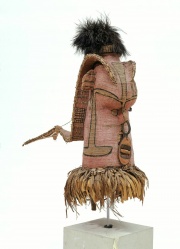Difference between revisions of "Pith"
Jump to navigation
Jump to search
m (Text replace - "== Authority ==" to "== Sources Checked for Data in Record ==") |
|||
| Line 1: | Line 1: | ||
| − | [[File:1994.410-SC1629.jpg|thumb|]] | + | [[File:1994.410-SC1629.jpg|thumb|Pacific Islander Headdress<br>MFA# 1994.410]] |
== Description == | == Description == | ||
| Line 8: | Line 8: | ||
shola; pith paper | shola; pith paper | ||
| − | == | + | ==Resources and Citations== |
* ''The American Heritage Dictionary'' or ''Encarta'', via Microsoft Bookshelf 98, Microsoft Corp., 1998 | * ''The American Heritage Dictionary'' or ''Encarta'', via Microsoft Bookshelf 98, Microsoft Corp., 1998 | ||
Latest revision as of 16:41, 10 August 2022
Description
The primary tissue system in the procambial strands of vascular plants. Pith paper is made from long ribbons of spirally cut pith obtained from from rice paper trees, Tetrapanax papyrifera cultivated in China, Japan and Taiwan from Aralia papyrifera cultivated in Thailand. The exposed cellular structure of the pith gives the paper a unique spongy structure. The delicate, porous texture of pith is also used to make artificial flowers, lightweight pith helmets, paintings, and molded figurines.
Synonyms and Related Terms
shola; pith paper
Resources and Citations
- The American Heritage Dictionary or Encarta, via Microsoft Bookshelf 98, Microsoft Corp., 1998
- A Glossary of Paper Conservation Terms, Margaret Ellis (ed.), Conservation Center of the Institute of Fine Arts, New York City, 1998
